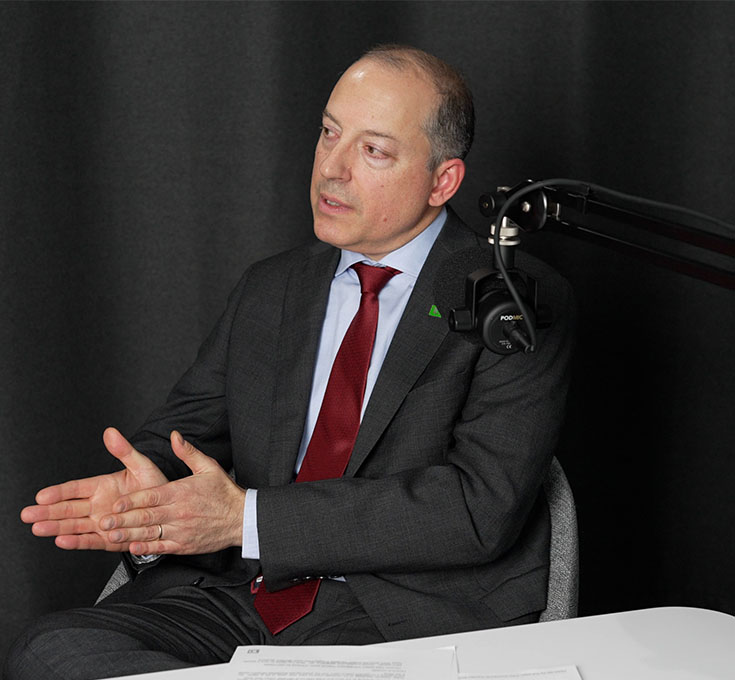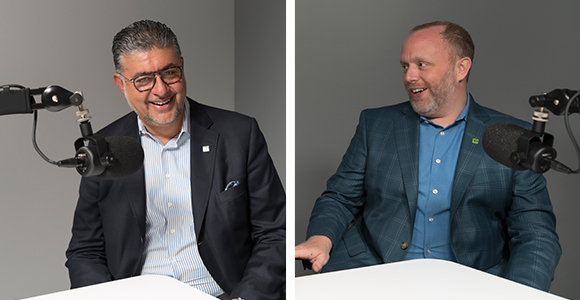Guests: Geoff Bertram, Managing Director and Co-Head, Global Financial Institutions, Investment Banking, TD Securities and Jim Spencer, Managing Director and Co-Head, Global Financial Institutions, Investment Banking, TD Securities
Host: Amy Van Arnhem, Managing Director and Head of Canada Senior Relationship Management, TD Securities
Following a difficult year for financial institutions, what might be in store for 2024? Geoff Bertram returns to Viewpoint alongside Jim Spencer to discuss with host Amy Van Arnhem what commonly happens following a crisis year, when M&As might accelerate and how banks focusing on balance sheet optimization can more soundly weather an economic downturn.
Listen to additional episodes for more perspectives from a variety of thought leaders on key themes influencing markets, industries and the global economy today.
This podcast was originally recorded on January 9, 2024.
NARRATOR: Welcome to Viewpoint, a TD Securities podcast. Listen in as we draw perspectives from a variety of thought leaders on key themes influencing markets, industries, and the global economy today. We hope you enjoy this episode.
AMY VAN ARNHEM: Hello, and welcome to episode 26 of Viewpoint, a TD Securities podcast. My name is Amy Van Arnhem, and I will be your host for today's episode. With TD's recent announcement of the significant expansion of our Global Financial Institutions team, I'm excited to have Geoff Bertram and Jim Spencer, managing directors and co-heads of our Global Financial Institutions investment banking team, join me today.
Geoff brings more than 23 years of experience in North American capital markets, including 12 years with TD Securities' Equity Capital Markets Group. Jim brings more than 25 years of experience, most recently at Credit Suisse, where he was head of Americas for the Financial Institutions Group since 2014. Thank you both for joining me today as we discuss some of the key themes in 2024 for the financial-services industry. So Geoff, maybe to start off with, could you outline some of the key changes we've made to our Global Financial Institutions franchise at TD Securities?
GEOFF BERTRAM: This is, I guess, about a year since we recorded our last podcast together, and I would be lying if I said we didn't have a bit of a plan as to what we were trying to do when we were talking last year. But I don't think we predicted quite how fast that we were going to be able to do it. And so to maybe give you a bit of background, when we last talked in January of last year, we were in the pre-closing cycle of the Cowen transaction.
And we realized when we were working on that transaction that we-- with the combined TD and TD Cowen organizations, we were going to be in a position where we had all of the pieces, pretty much, to be able to build a real global financial-institutions business. And really, what the acquisition brought us was things like the equity capital markets, the equity research, equity sales and trading, and the private capital-markets groups that TD had in certain circumstances but maybe not quite as deep in the United States.
But what we were really lacking was a equity research and investment-banking platform in a lot of depth within the financial-services space in the United States. And so we had all the pieces. We had the groundwork. We had a strong existing foundation in Canada and within certain subsectors in FIG in the United States, but what we didn't have was a team the quality and the size of Jim's that really covered all the subsectors that we cared about in the United States.
And so I think the plan was originally that it was going to be a longer-term build. And then Jim will get into some of the circumstances as to how things got accelerated a bit. It moved a lot faster than, I think, even we would have planned or hoped. And the one thing I'll probably also call out is that the research function is really, really important to what we're doing here.
Like, we've been able to acquire three very high-quality research analysts and their teams. Two of the three have initiated coverage already. They're fantastic. They have great market support. And they have Scott Smith, who works on the specialty-sales side, who's really been helpful in terms of distributing all that information.
AMY VAN ARNHEM: It really is incredible to think about the amount of growth we've gone through over the last year. And I know the feedback has been very positive from clients so far. So that's great. So Jim, I guess, first, welcome to TD Securities. It's great to have you. And what was it about the TD platform and the opportunity that enticed you to join us? And, I guess, what are you most excited about, in terms of some of the future growth opportunities?
JIM SPENCER: So I guess one of the main factors that attracted me to the TD platform was stability-- TD's AA-rated, $6 trillion US balance sheet, 15% CET1 ratio. Its primary regulator is North American, not European. And there's just a lot more stability with this platform. So for me, that was a pretty important ingredient.
Second, I would say, it's the platform and the combined platform. So what we're able to do in equities and research with Cowen has been fantastic. Debt capital markets, leveraged finance, corporate banking with the TD Securities platform, they're all very established. And plugging in my team has been really easy on this platform. It's been a great combination thus far. So those are a couple of things I would say jumped out.
The other thing that was notable with TD, in particular, in my earlier conversations was that this was strategic. Everybody I met with all the way up to the C-suite at TD said building out FIG is strategic. We want to do it in the right way. We want to do it in a holistic way.
So what do we need? Research, having Scott Smith in sales, having additional debt capital markets support; there's a ratings-advisory person that has joined, bringing over a number of junior resources, along with some of the senior folks. It's all kind of come together in a holistic way that really helps us serve our clients.
A number of things attracted us to be here. I think having a number of my colleagues join me is one validation. Client engagement is a second one. And that's what's really got me energized and excited, the client engagement thus far. And we've already announced a couple of M&A deals, as well as several capital markets transactions. And the pipeline is continuing to build.
So I'm excited about that growth opportunity in the near term. It's going to be executing on these mandates and establishing the relationships between TD and the new clients that we're bringing over. Longer term, we can talk about new geographies. What about Europe? What about Asia? But in the near term, Geoff and I want to make sure we get North America right. So that's where we're focused on and growing and have already had some early success. So I'm excited about that.
AMY VAN ARNHEM: Well, we talk a lot about one TD. And this is really a great illustration of how that all works and how you can sort of build out the teams across all the different products to really support this industry group. So we're all really excited and glad to have you and your team here.
Just switching gears a little bit and talking a little bit more about what we're seeing in terms of some of the key themes, Jim, you've spent your career advising a wide range of financial institutions, and most notably in the banking sector. I think we all know 2023 was a very difficult year for banks globally. Could you please share with us your perspective on what you think we're likely to see in 2024 as a result of last year's events?
JIM SPENCER: Hopefully, not a repeat of 2023.
NARRATOR: Hopefully not.
JIM SPENCER: Let's go there. But 2023 was an exceptional year and very volatile year. I'd have to go back to the financial crisis to find a similar-type pattern, where you had rates going up at an unprecedented pace and deposits flowing out of the system that caused Silicon Valley, Signature Bank, First Republic to, basically, run out of funding and be closed.
And so that's pretty remarkable for that to happen in that short period of time. But that was a wake-up call for the industry and really shook the confidence of depositors, as well as bankers. And so what was interesting about what happened was the large money-center banks wound up getting deposit inflows and saw a lot more customer activity. It was the regional banks that suffered more.
And so going into 2024, after any crisis, there's always a few things that happen. One, the regulatory pendulum swings back hard against the industry. We're seeing that right now. And the regional banks are starting to encounter pushes by lawmakers and the regulators to have more liquidity, have more capital, et cetera. And that's playing itself out. And so it's a tougher regulatory environment. So that's one thing that we're certainly seeing.
Two, after a crisis, banks need to focus on capital and focus on their balance sheet. And so we're seeing a lot more balance-sheet optimization on both sides of the balance sheet but more prevalently with loan portfolios. We're seeing loan-portfolio sales.
We're seeing synthetic sales, a version called credit risk transfer trades that are getting done. We're seeing some liability management, where banks are taking out more expensive debt as rates have come down. And so that's a second theme that we always see after crises. And we're in the early stages of seeing that right now.
The third thing is M&A. And M&A has not picked up yet. I think there's a few headwinds. One, bank stock prices, up until the recent rally, have really lagged and were at all-time lows. Two, the mark to market on the balance sheet has been a problem because banks are invested in, largely, fixed-income instruments. And when rates go up, those assets fall in prices. And so that has an impact on M&A.
And third, the regulatory environment. I think people are concerned about going and proposing to do a deal with the regulators, and are they going to make it tough on me? So those things have held back M&A. But I do think, longer term-- and I don't know if it's going to be 2024 or 2025-- but there's going to be some pent-up M&A and consolidation that will get done. And so that's going to be an increasing theme in 2024.
AMY VAN ARNHEM: Well, we will get a little bit more into the lending market in a subsequent question, but I did want to just ask you a little bit more around the capital risk transfer trades, and just sort of how bank capital levels do look now. And is it a matter of banks really looking to shore up that regulatory capital, or is it more of a credit opportunity for banks to continue to grow? Like, are you seeing a little bit of both of that within the US, within the Canadian market?
JIM SPENCER: So the premise around a lot of the current credit risk transfer trades was the Basel III endgame. And so what's been proposed in Basel III is, basically, increasing the risk-weighted assets of banks across a number of different loan categories-- CRE, resi loans, et cetera. And so if the risk-weighted assets increase, it lowers your capital ratio. So that has made banks focus a lot more on ways to, I guess, manage RWA, to manage their capital position.
Basel III endgame is a proposal and has not been finalized. People expect there to be changes to it. And so it won't be phased in until 2025 and 2026. But in the meantime, transactions are getting done. And so that begs the question, is it really regulatory-driven?
And so the actions of banks now suggest that it's driven more by the balance-sheet optimization, doing what a good banker does in terms of crisis. Look at your portfolio and say, how can I make the mix better from a risk perspective, better from an earnings perspective? And that's certainly what we're seeing, and really driving the credit risk transfer trade activity.
And not everything's going to be done in a synthetic fashion like a credit risk transfer trade. You're going to continue to see loan sales. You'll see whole securitizations. And so there's a number of different forms this balance-sheet optimization will take place. And so we're in the early innings of that. We expect to see a lot more of this activity take place in 2024.
AMY VAN ARNHEM: OK. Will definitely be something interesting to watch.
GEOFF BERTRAM: I was going to say, just to the Basel III endgame piece, like, maybe a bit of a plug to Jaret Seiberg, who works within our Washington Research Group, which is part of the TD Cowen acquisition. Jaret publishes a lot on this topic, and everything that I've heard from people who are active in the bank space think pretty highly of him. And he's got a pretty good read on what's going on, and he's saying exactly what you're saying, Jim, which is like, I'm not sure what the proposal looks like is what it's actually going to look like in reality.
JIM SPENCER: Right.
AMY VAN ARNHEM: Yeah. I understand that the insurance segment has been particularly busy for M&A and capital raising in North America over the last few months. Why is that? And do you expect the trend to continue?
GEOFF BERTRAM: Yeah, it's a good question. And I would say it's probably our busiest-- the area where we're busiest these days. And the activity level has been pretty strong over the last few years, but it feels like it's really coming to a head now.
And I think it's a few things. Number one, I think the insurers have been beneficiaries of, I think-- when you see the banks starting to trade off a bit-- and we've seen this in Canada, in particular-- you need someplace else to put your financial services exposure. In a lot of cases, that's going over to the insurers. And we saw a bit of that last year.
But this is really a continuation of a trend we've seen. And so I'll look at it in two different directions. And so there's the brokerage and kind of distribution space, and then there's the carrier space. And these exist across kind of all the key verticals, like, life, health, and property and casualty insurance. But so let's-- if we start with the brokerage space-- so M&A has been extremely active. It's been active on the corporate side.
It's also been active within the private-equity space. It's probably one of the largest areas of activity within the private-equity space. There isn't a large private-equity firm that doesn't have an insurance brokerage platform or some sort of insurance-distribution platform on the go. And we've started to see some fairly large M&A transactions, including one that we advised on back in December, around Aon and NFP. So that was a very successful transaction, and I think we're only probably going to see more of those going forward.
The financing side has been extremely busy. A lot of these companies, the ones that live within the private-equity universe, are financed through high-yield debt and term loans. And that has been an area that we've been incredibly active, as has, frankly, the rest of the Street. And over time, you're probably going to see-- in addition to more M&A, you're probably going to see the IPOs come back.
The broader IPO market's been weak. I don't think that's a surprise to anybody looking over the last couple of years. But if you think about where we're going to see some IPO activity within the FIG space coming up over the next couple of years, I think it would be pretty hard to bet against the insurance distribution space being an area of activity because some of the platforms are just getting so big now.
On the carrier space, I think you're seeing a lot of activity through non-core asset sales, reinsurance of blocks of business, particularly in the life and annuity space. The other thing we've seen is, just away from the corporate activity, which has been very big, the private-equity space has been very active, as well. And it's gone from a world where we've really been-- it's been driven by corporate activity to where large private-equity firms are looking at insurance as a way to leverage their alternative asset-management capabilities.
And that's something I don't think we've seen the end of. I think that's going to continue to grow as time passes here because, I think, if you're a large private equity or private capital manager owning an insurance business, that provides you a tremendous float of assets to be able to manage through the life of these insurance contracts. And so these are sophisticated, very strong financial institutions that are perfectly suited to be owning insurance companies. And so I think we'll see more of that going forward.
AMY VAN ARNHEM: So Jim, maybe to close-- I did promise we'd go back to the lending space, which I do want to spend a little bit of time on. And happy for both of you to opine here because I do think it is very critical this year. But the banks are obviously one part of a broader lending ecosystem.
And with areas such as private corporate credit and consumer finance being areas of continued growth, how do you see this part of the market evolving? And within that conversation, speak to some of the things we spoke about before in a higher-rate environment and just some of the stresses we might be starting to see or people are really watching to see.
JIM SPENCER: So the shadow-banking market has always been a focus of regulators, especially after the financial crisis. It's true currently that there's a pretty significant shadow-banking element out there. And the biggest growth has been with the private credit funds. And we've seen a huge amount of funds flowing into these vehicles. And the competition with Wall Street banks on bank-loan syndication has been fierce.
And so over the past three years, there's been a lot more loans from corporates made direct with private credit than the bank-syndication market. And it's a multiple. It's not close. I think as banks shift to more risk-on approach, you'll see the market share balance out a little bit more between the two. But it feels like credit, from a private-credit side, it's here to stay for a while.
And so we're certainly seeing a lot of banks, including ourselves, that are looking at having our own ability to go direct and have our own private credit funds. And so I think that's going to continue to be a trend because it's a much more efficient process. It's a bilateral discussion, and corporations like that approach. And the terms have been pretty aggressive and borrower-friendly. So I do think that that is a lending arm to stay.
There are a lot of skeptics out there saying that private credit is being aggressive in making loans that banks wouldn't. And when you look at regulatory reports-- and there's one done every six months by a group of regulators-- and look where the problem credits are when they look at the largest loans in the US-- a majority of the issues are outside of the banking industry. And so that would suggest that there is more risk being taken in the private-credit markets.
But we haven't seen huge blowups yet. I'm not aware of anybody that's suffered losses that would cause them to close their doors or return money to investors. People are certainly more leery of spaces or lending areas like office space in major urban areas.
But so far, it's being managed effectively. We'll have to see if there's a downturn in the economy. Then I think you'll see a broader impact. And it should impact the private capital markets more so than what's on the banks' balance sheets, but even the banks would be impacted.
So we'll see. I think I'm cautiously optimistic that credit quality will remain good during this period. There will be some flareups in certain areas as office space that I mentioned. And I do think more losses will be incurred outside the banking system than inside the banking system. But it's certainly something we're focused on with our clients. And then I know the Federal Reserve is very focused on this, as well. So we'll have to see how things end up at the end of the year.
AMY VAN ARNHEM: Well, as always, this sector has lots of dynamic and interesting things to talk about. So thank you both for joining. I'd also just like to plug that you will be talking about these themes and several others at the Financial Services Conference, which is coming up January 19 in Toronto. And so thank you both very much for being here with me today. Appreciate it.
GEOFF BERTRAM: All right. Thank you, Amy.
JIM SPENCER: Thanks.
AMY VAN ARNHEM: Thanks.
NARRATOR: Thank you for listening to Viewpoint, a TD Securities podcast. If you enjoyed this episode, subscribe to this series on Apple Podcasts or on your favorite podcast platform. For more thought-leadership content, visit tdsecurities.com and follow us on LinkedIn for all the latest TD Securities updates. For relevant disclaimers to this podcast, please refer to the Viewpoint episode page on our website.
This podcast should not be copied, distributed, published or reproduced, in whole or in part. The information contained in this recording was obtained from publicly available sources, has not been independently verified by TD Securities, may not be current, and TD Securities has no obligation to provide any updates or changes. All price references and market forecasts are as of the date of recording. The views and opinions expressed in this podcast are not necessarily those of TD Securities and may differ from the views and opinions of other departments or divisions of TD Securities and its affiliates. TD Securities is not providing any financial, economic, legal, accounting, or tax advice or recommendations in this podcast. The information contained in this podcast does not constitute investment advice or an offer to buy or sell securities or any other product and should not be relied upon to evaluate any potential transaction. Neither TD Securities nor any of its affiliates makes any representation or warranty, express or implied, as to the accuracy or completeness of the statements or any information contained in this podcast and any liability therefore (including in respect of direct, indirect or consequential loss or damage) is expressly disclaimed.
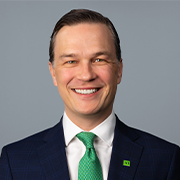
Geoff Bertram
Managing Director and Co-Head, Global Financial Institutions, Investment Banking, TD Securities

Geoff Bertram
Managing Director and Co-Head, Global Financial Institutions, Investment Banking, TD Securities

Geoff Bertram
Managing Director and Co-Head, Global Financial Institutions, Investment Banking, TD Securities
Geoff is a Managing Director at TD Securities (TDS) and Co-Head of the Global Financial Institutions Investment Banking Group – a team focused on providing merger, acquisition, and financing advice for TD’s financial institutions clients. Geoff has over 23 years of experience in the North American capital markets. Prior to joining the Financial Institutions Group, Geoff worked for 12 years in TDS’ Equity Capital Markets group advising corporate clients on initial public offerings, follow-on offerings, and equity-linked securities. He joined TDS in 2006 after spending six years working in both the Investment Banking and Equity Capital Markets groups in the Toronto and New York offices of a global investment bank.

Jim Spencer
Managing Director and Co-Head, Global Financial Institutions, Investment Banking, TD Securities

Jim Spencer
Managing Director and Co-Head, Global Financial Institutions, Investment Banking, TD Securities

Jim Spencer
Managing Director and Co-Head, Global Financial Institutions, Investment Banking, TD Securities
Jim joined TD Cowen in September of 2023 to build out the U.S. Financial Institutions practice and co-head the Global Financial Institutions (FIG) franchise. Previously, Jim was Vice Chairman and Head of Americas for FIG at Credit Suisse since 2014, where he served on the managing director promotion and investment banking finance committees. Jim graduated cum laude from Texas Christian University in 1989 with a BBA degree. In 1998, he received his MBA from the University of Virginia’s Darden Graduate School of Business Administration and began his investment banking career.
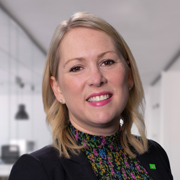
Amy Van Arnhem
Managing Director and Head of Canada Senior Relationship Management, TD Securities
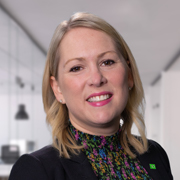
Amy Van Arnhem
Managing Director and Head of Canada Senior Relationship Management, TD Securities

Amy Van Arnhem
Managing Director and Head of Canada Senior Relationship Management, TD Securities
Amy is responsible for providing holistic cross product global coverage to senior executives for Canadian institutional clients. In her role she manages stakeholder relationships by promoting a collaborative and integrated approach across the firm. Joining our firm in 2001, Amy began her career at TD in the retail sector. In 2007, she joined the Sales and Trading rotational program at TD Securities where she gained exposure in Asset Securitization, Proprietary Equity, and Institutional Equities. In 2008, she joined the Institutional Equity Sales desk team where she covered Canadian equity clients.






